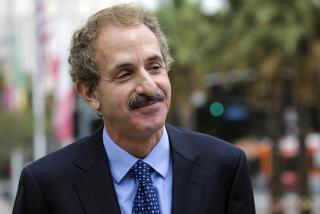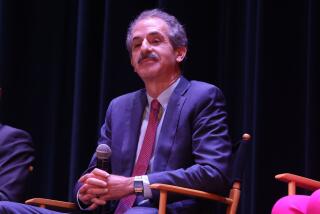City Archivist Angry That Yaroslavsky Took Papers With Him : Government: Documents are part of L.A.’s ‘historical conscience,’ records keeper says. Former councilman says he wanted to assure the materials’ safekeeping.
- Share via
When Zev Yaroslavsky left Los Angeles City Hall, he took a big chunk of local history with him, and that has made Hynda Rudd madder than a librarian at a book-burning.
As the overseer of the City Hall archives, Rudd was upset when she learned that Yaroslavsky hauled away a treasure trove of city records when he left his City Council seat in December to take up his duties as a member of the Los Angeles County Board of Supervisors.
“I see these records as part of the city’s historical conscience,” said Rudd, a librarian and historian by training who rules the vault-like city Records Center east of Downtown.
“Zev was such an important figure in city government, his records are likely to be very valuable,” Rudd said Monday. “They should be here.”
By Rudd’s account, at least 120 boxes of records collected, written, compiled and possessed by Yaroslavsky’s office are missing. At least that many boxes of inactive documents were removed from the center by Yaroslavsky’s office staff just before he left.
The files in Yaroslavsky’s office are gone too. “There is hardly enough left to fill a filing cabinet,” Rudd said.
Rudd, arguing that the records are city property, took her concerns to the city attorney. Late Monday afternoon, Deputy City Atty. Henry Morris, the city’s legal expert on records issues, had a hurried telephone conversation with Yaroslavsky.
Morris would not discuss the matter, but Yaroslavsky sought to minimize the dispute over the yellowing records, which range from his earliest thoughts about the LAPD investigation of the Robert F. Kennedy assassination to his recent views about city finances as chairman of the city’s Budget Committee.
Yaroslavsky, who has a master’s degree in history from UCLA, said he removed the documents because he was afraid the city would not take good enough care of them.
“Look, I am by training a historian, and I have a strong, deep sense about the importance of preserving historical documents,” he said. “The documents are intact.”
Yaroslavsky, a self-proclaimed pack rat who senses that his files could be of value to students of municipal history, said he took the documents to ensure they are protected and made available to posterity.
“I really don’t know how extensive the city’s archives operation is,” he said. “We decided to keep them because we wanted to protect them. I didn’t want them destroyed.”
As of late Monday, Yaroslavksy said he would be happy to give the documents back if given the proper assurances that they would be safe. “We just want to work out an arrangement to see that these records are not destroyed,” he said.
In fact, having a historically sensitive city bureaucracy assume control of the documents would be a relief, Yaroslavsky said.
They are now being stored in a private facility in the San Fernando Valley, with the rent being paid by one of Yaroslavsky’s political committees.
“The cost isn’t trivial,” he said.
More to Read
Sign up for Essential California
The most important California stories and recommendations in your inbox every morning.
You may occasionally receive promotional content from the Los Angeles Times.













